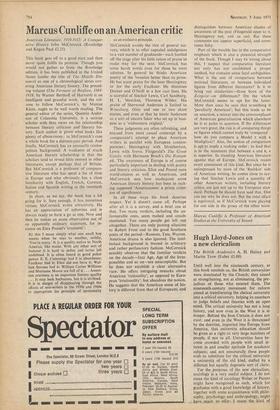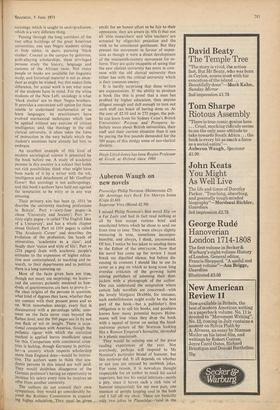Hugh Lloyd-Jones on a new clericalism
Until well into the nineteenth century, as this book reminds us, the British universities were dominated by the Church; they aimed at strengthening, not at eliminating, the pre- judices of those who entered them. The nineteenth-century movement for reform aimed at transforming the clerical university into a critical university, helping its members to judge beliefs and theories with an open mind. The critical university has not a long history, and now even in the West it is in danger. Behind the Iron Curtain it does not exist; and even in the West it is threatened by the doctrine, imported into Europe from America, that university education should be given as a right to very large numbers of people, if not to all. Universities have be- come crowded with people with small in- terest in and smaller aptitude for academic subjects; and not unnaturally these people wish to substitute for the critical university a university of the old kind, staffed by a different but equally dogmatic sort of cleric.
For the purposes of the new clericalism, sociology is a very useful subject. I do not mean the kind of sociology Weber or Pareto might have recognised as such, which for graduates with a good knowledge of history, together with some acquaintance with philo- sophy, psychology and anthropology, might have.. mach to offer. I mean the kind of .1
sociology which is taught to undergraduates, which is a very different thing.
Passing through the long corridors of the vast office buildings of the great American universities, one sees Negro students sitting at little tables, in pairs, pursuing 'black studies'. Coaxed to the campus by generous, guilt-allaying scholarships, these privileged persons study the history, language and customs of the African races. Not many people or books are available for linguistic study, and historical material is not as abun- dant as might be wished; but this makes little difference, for actual work is not what most of the students have in mind. For the white students of the New Left, sociology is what 'black studies' are to their Negro brothers. It provides a convenient soft option for those unable to understand mathematics or to learn languages; its practitioners have evolved mechanical techniques which 'can be applied without any exercise of critical intelligence; and, like theology in the old clerical university, it often takes the form of instruction in the very beliefs which the student's emotions have already led him to embrace.
An excellent example of this kind of modern sociological science is presented by the book before me. A study of academic persons in this country is a subject that holds out rich possibilities; think what might have been made of it by a writer with the wit, intelligence and detachment of Mr Geoffrey Gorerl But sociology is not anthropology, and this book's authors have held out against the temptation to be witty or in any way amusing.
Their primary aim has been (p. 451) `to describe the university teaching professions in Britain'. Part i—sixty-four pages—is about 'University and Society'; Part sixty-eight pages—is called 'The English Idea of a University', and has a whole chapter about Oxford; Part to (104 pages) is called 'The Academic Career' and describes the evolution of the profession, the heads of universities, 'academics as a class', and finally their 'status and style of life'; Part Iv (224 pages) deals with academic people's attitudes to the expansion of higher educa- tion now contemplated, to teaching and re- search, to their departments and to politics; there is a long summing-up.
Most of the facts given here are true, though not many are surprising; we learn— and the answers patiently rendered to hun- dreds of questionnaires are here to prove it— the class origins of the persons in question, what kind of degrees they have, whether they are content with their present posts and so on. With remorseless energy, every fact is documented with a percentage table; com- ment on the facts never rises beyond the flattest level, and the 560 pages are lit by not one flash of wit or insight. There is occa- sional comparison with America, though the pedantic rigour with which the statistical method is applied leaves insufficient space for this. Comparison with continental coun- tries is lacking, though Germany in particu- lar—a country which respects scholarship more than England does—would he instruc- tive. The authors seem to think that aca- demic persons in this island are well paid. They would doubtless disapprove of the German professor's having an opportunity to increase his salary every time he receives an offer from another university.
The authors do not conceal their own sympathies; they would go considerably be- yond the Robbins Commission in expand- ing higher education. They must be given
credit for an honest effort to be fair to their opponents; they are aware (p. 456 f) that not all 'elite researchers' and 'elite teachers' are actuated by oligarchic prejudice and the wish to be considered gentlemen. But they present the movement in favour of expan- sion as though it were a direct development of the nineteenth-century movement for re- form. They are quite incapable of seeing that the new clerical university has more in com- mon with the old clerical university than either has with the critical university which is their common enemy.
It is hardly surprising that these writers are expansionists. If the ability to produce a book like this is proof that a man has profited by higher education, then anyone diligent enough and dull enough to turn out such stuff can boast of having done so. At the cost of £2.10 and in 272 pages, the pub- lic can learn from Sir Sydney Caine's British Universities: Purpose and Prospects in- finitely more about British universities, their staff and their current situation than it can by paying the five pounds demanded for the 560 pages of this stodgy tome of neo-clerical divinity.
Hugh Lloyd-Jones has been Regius Professor of Greek at Oxford since 1960



































 Previous page
Previous page